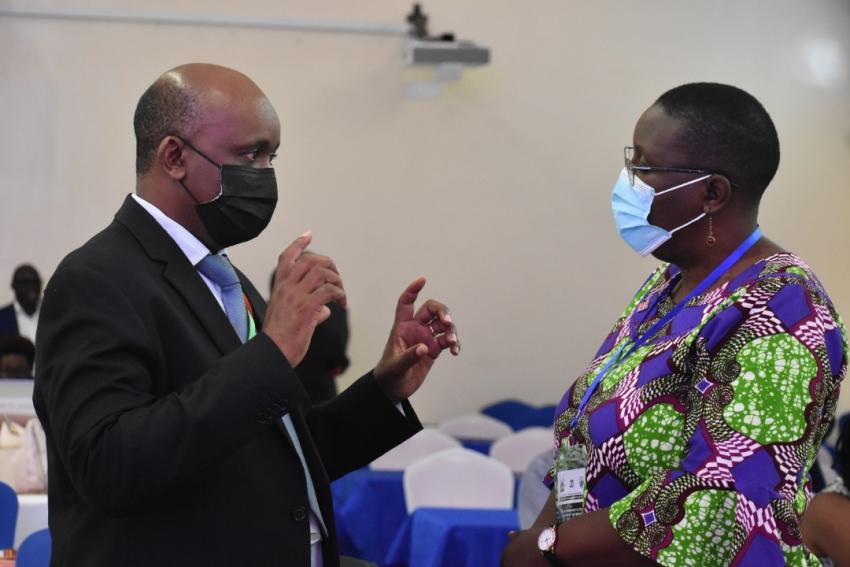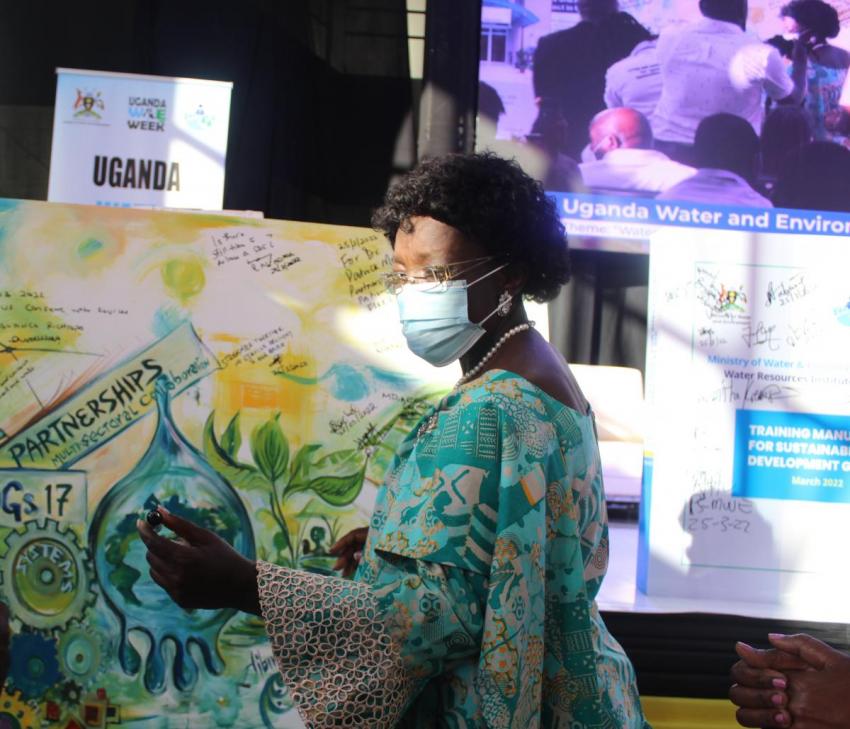There was a time in Uganda when water and environment issues were not topics of national debate
Published on: 31/03/2022
The irony is that the country is endowed with natural resources including flora and fauna, wildlife, and a tropical climate. The agricultural and tourism service industries which are the bedrock of Uganda’s gross domestic product almost solely depend on the natural environment. Yet there has been a perpetual neglect of structures and systems that manage, facilitate, maintain, and harness these resources sustainably for the optimal benefit of all Ugandan residents, now and in future. The unfortunate assertion that more important matters of national interest such as security, health, and poverty alleviation (to mention some) negate the fact that water and environment are at the nexus of peaceful coexistence, and a healthy productive population.
That is now steadily changing. For the fifth year in a row, the Ministry of Water and Environment through its Water Resources Institute this March 2022 convened a successful Uganda Water and Environment Week (UWEWK) themed “Water and Environment for peace and socio-economic transformation of Uganda”.
Water, environment and climate change professionals interacted with researchers, advocates, entrepreneurs, politicians, civil society, policy makers, the media, government technical experts and citizens through panel discussions, debates, dialogues, experience sharing, innovation and social networking to interrogate policies and practices that have impacted the state of Uganda’s resources; and to propose actionable changes that can propel the sector as the vehicle to achieve the national targets in Vision 2040, the Third National Development Plan (NDPIII) and international commitments of the Sustainable Development Goals by 2030.

Julius Mukunda, Executive Director of the Civil Society Budget Advocacy Group and Jane Nabunnya Mulumba, IRC Uganda Country Director, hosted the financing session
Expert panels debated sub-themes on promoting peace and stability; building resilience to various risks and shocks; financing water, environment, and climate change; and partnerships and inter-sectoral collaboration in water and environment management and development. Participants were challenged to rise beyond the discussion tables and act on issues at hand.
“It is time to put your money where your mouth is. You can be deliberate in making the case, with evidence, that water and environment can no longer be left at the periphery of development” - UNDP Representative in Uganda, Ms Elsie Attafuah.
But that costs money, alongside other oilers such as expertise, tools, pro-people policies and a willing political leadership. There are prospects for private investment but that should not excuse the government from its mandate to appropriate adequate funding to water and environment within the available national envelope.
“Money can be found if the will is there. We ask that at least 50% from the environment levy be ploughed back into our ministry to conserve water and environment resources, to establish necessary infrastructure, facilitate alternative livelihoods and to boost the enforcement team” - Hon Beatrice Anywar, State Minister for Environment.
Financing water, environment, and climate change was tackled in-depth at the thematic dialogue hosted by IRC Uganda and the Civil Society Budget Advocacy Group (CSBAG) bringing to the panel the Private Sector Foundation of Uganda, Ministry of Finance, Planning and Economic Development, Water.org, Members of Parliament, climate change financing experts and civil society represented by Community Integrated Development Initiatives.
“When less is available for more people, they turn to the environment, which is considered free, for survival. It is urgent to make access equitable; compile and present the evidence of the dilemma of funding climate shocks vis- à-vis development, and state interest versus public interest” - Dr Fred Muhumuza, Development Policy Researcher, Makerere University and keynote speaker.
The argument that the national funding basket spreads out too thin across the various public services that the government is mandated to provide, was countered by the available opportunities to access international funding especially for climate change, address corruption and lead by example in practising policy.
Expressed across the board was the underlying disinterest in domestic investment in water and environment businesses.
“Private enterprises are the people with the money, but despite our efforts to incentivise WASH businesses, the how-to of successfully pitching water and environment as a viable venture beyond the seasonal corporate social responsibility actions still eludes us” - Jane Nabunnya Mulumba, Country Director, IRC Uganda.

Dr Callist Tindimugaya, Water Resources Institute, (on screen) thanks panellists, moderators, keynote speaker and MPs at the finance dialogue session
Panellists resounded the lack of political will to prioritise water and environment, evidenced by the rhetoric in policy.
“Implementing policies is as good as instituting them. Investors would love regulations that are fewer, simpler and less costly. Importantly, our government should walk the talk: why for example, are all industrial parks established in wetlands? ” - Francis Kisirinya, Deputy ED PSFU.
The climax of the UWEWK22 was punctuated by the dialogue session on partnerships and inter-sectoral collaboration. Perhaps second to limited financing, the issue of poor coordination especially among responsible Ministries, Departments and Agencies has persisted as the causal factor for under prioritisation of water and environment in Uganda.

First Deputy Premier Rt Hon Rebecca Kadaga signs the mural created in real time during the closing ceremony
“In a complex world of interlinked systems of people and things, cross-sectoral working is essential to drive change through collective action. But partnerships can only succeed if there is a clear vision that everyone knows and is committed to; a strong base of shared information; a coordination hub, and above all the willingness to be flexible, pragmatic and patient with one another.” – Dr Patrick Moriarty, CEO IRC and keynote speaker.
This year, the UWEWK was intentional in breaking the walls by actively involving constituents that would be considered non-conventional to the sector, including children and young people, education, sports and games enthusiasts, religious and traditional institutions, the legal fraternity, and creative artists. Grassroots communities were this time actively engaged through the regional pre-cursor events around the country.
That traditional cultural leaders and religious clerics can sit around the same table to articulate faith-based and cultural tools available to address climate change adaptability at the grassroots is not to be underestimated. It is an indication that the sector is intentional in changing the status-quo, by pushing an agenda that resonates with all stakeholders regardless of constituent and class, to the benefit of all Ugandans.
The week was also a platform for accountability. Thematic areas were derived from the recommendations at the 2021 edition of the UWEWK.
“We are intentional in making sure that we do not only pay lip service, but take action on the matters we raise for the betterment of our water and environment” – Dr Callist Tindimugaya, Commissioner Water Resources Planning and Regulation, Coordinator Water Resources Institute
At IRC we have strong opinions and we value honest and frank discussion, so you won't be surprised to hear that not all the opinions on this site represent our official policy.